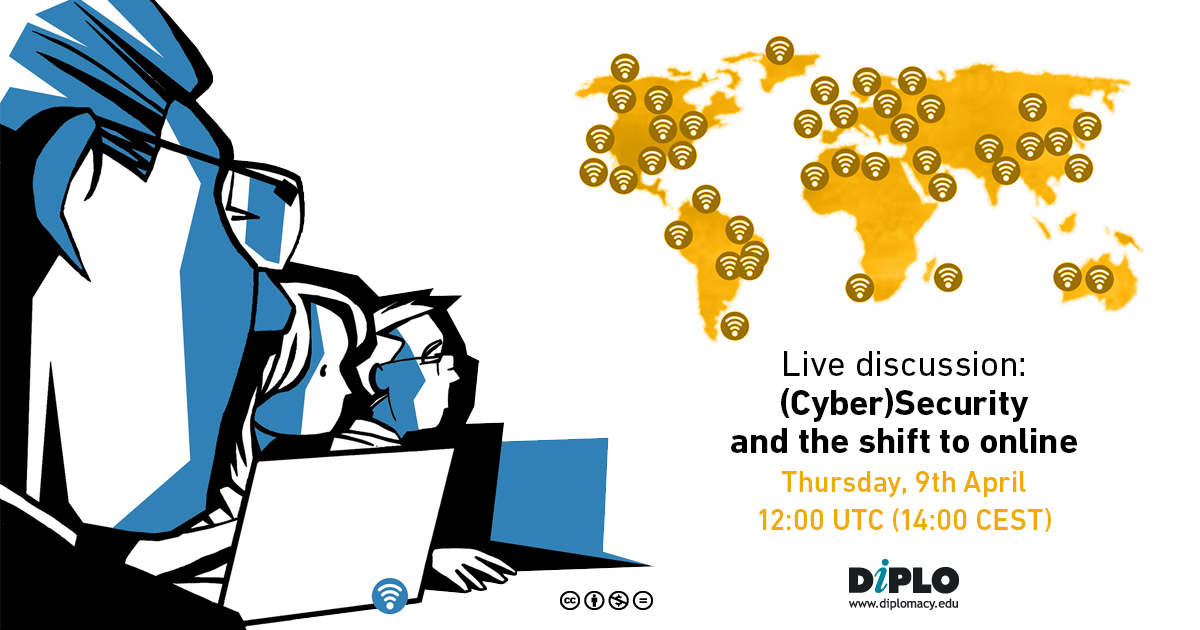The rapid shift to online work makes us more dependent on the critical Internet infrastructure and digital services. While this infrastructure is already under a lot of pressure as a result of the recent surge in the use of online tools, DDoS attacks against health or e-learning platforms aggravate this strain. Our demand for more information on COVID-19 makes us easy victims for perpetrators of phishing schemes impersonating health institutions including the World Health Organization. Ransomware campaigns, which often lock down critical systems in hospitals and medical research centres, may now lead to more fatalities. In our next live discussion on COVID-19, on Thursday, 9th April 2020 at 8 am EDT, we will ask our experts: Is the COVID-19 crisis leading towards an increasingly insecure cyber-world?
As our communications shifts online, confidentiality also becomes a major challenge. Numerous online meeting platforms and messenger apps have embedded encryption, yet only some services encrypt data between users and platform servers, and fewer encrypt data on their servers. As deepfake algorithms advance, the integrity of information and authenticity of interlocutors may also become an issue.
Do cybersecurity risks increase in times of crisis, or do they just change form? What are the specific roles (and responsibilities) of authorities, the private sector, and users and communities? What could be the post-COVID-19 consequences?
Join us to revisit cybersecurity challenges during the COVID-19 crisis. We welcome your active participation in our live discussion.
Expert:
 Mr Vladimir (Vlada) Radunović is a lecturer in cybersecurity policy, Internet governance, and e-diplomacy on postgraduate and professional courses. He also serves as a member of the Advisory Board of the Global Forum on Cyber Expertise (GFCE) and as an expert with the Geneva Internet Platform. He served as a member of the Multistakeholder Advisory Group of the UN Internet Governance Forum (IGF) from 2012 to 2014. Vlada has been a lecturer, speaker, and resource person on a number of educational and training programmes and events worldwide, including within the WSIS and IGF processes. His professional and research focus is on Internet governance, broadband policy and net neutrality, cybersecurity and cyber-diplomacy, e-diplomacy, and capacity development. He holds an MSc in Electrical Engineering from the University of Belgrade and a Master’s in Contemporary Diplomacy from the University of Malta. He is currently working on his PhD in cybersecurity. Vlada is currently member of the Board of Directors of Diplo US.
Mr Vladimir (Vlada) Radunović is a lecturer in cybersecurity policy, Internet governance, and e-diplomacy on postgraduate and professional courses. He also serves as a member of the Advisory Board of the Global Forum on Cyber Expertise (GFCE) and as an expert with the Geneva Internet Platform. He served as a member of the Multistakeholder Advisory Group of the UN Internet Governance Forum (IGF) from 2012 to 2014. Vlada has been a lecturer, speaker, and resource person on a number of educational and training programmes and events worldwide, including within the WSIS and IGF processes. His professional and research focus is on Internet governance, broadband policy and net neutrality, cybersecurity and cyber-diplomacy, e-diplomacy, and capacity development. He holds an MSc in Electrical Engineering from the University of Belgrade and a Master’s in Contemporary Diplomacy from the University of Malta. He is currently working on his PhD in cybersecurity. Vlada is currently member of the Board of Directors of Diplo US.
Registrations are open:


